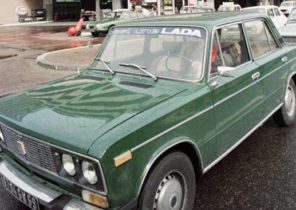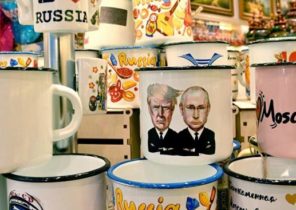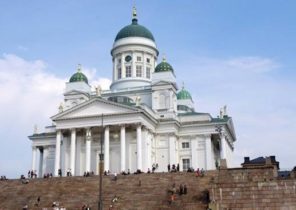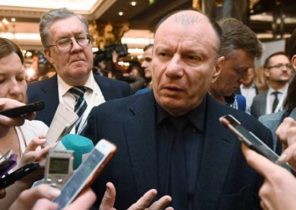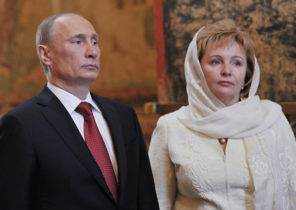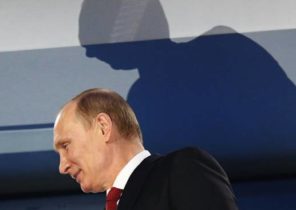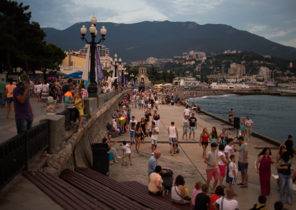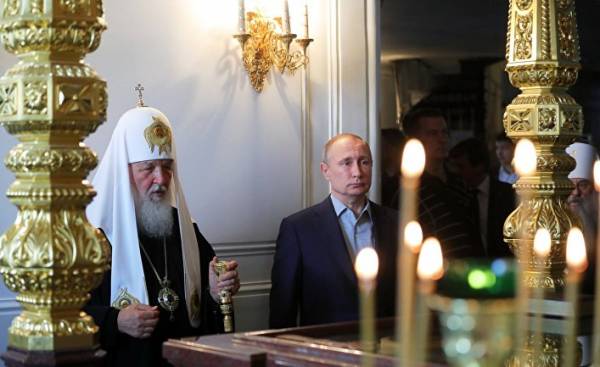
Front of Spaso-Preobrazhensky Cathedral, a crowd of people. Everyone is waiting for the Patriarch; he had just finished saying mass in honor of the patronal feast, which lasted two and a half hours. Over the Holy place floating bells ringing and the sun is shining. For a moment, around the sun appeared a rainbow. In the crowd, you hear “He’s here…” “He often comes here, but you’ll never know”, “sometimes you can even see him driving, he’s driving the car.” “He” is Vladimir Putin. The Russian President was here today, but showed a special humility. This morning he went into the crowd of pilgrims to communicate with people. Instead, Vladimir Putin welcomed the Patriarch and venerated the relics of the Holy founders of the monastery, St. Sergius and St. German, which are stored in the lower Church of Holy Transfiguration Cathedral.
Usually the Russians know how much their President makes for the Orthodox churches, after years. Balaam is something like the Northern Athos. This monastery located on lake Ladoga, the biggest lake in Europe, to the North of Saint Petersburg, just a few kilometers from the Finnish border. Valaam archipelago returned to monastic life in 1991. Now the Islands of the archipelago, there are several hermitages. One of them manages Alsatian monk, brother Seraphim, one of the most charismatic of the Holy fathers in this monastery. Vladimir Putin Valaam is “their” skit, where he goes several times a year. In the monastery four monks paint icons, and, of course, pray for the President, who regularly confesses. This skit is arranged in the housing for the head of the Russian Orthodox Church, Patriarch Kirill, with whom Vladimir Putin often leads to long conversations.
The Russian President is not one time played an important role in raising funds for the restoration of the Holy monastery. The monastery also enjoys special support Foundation of St. Andrew the Apostle, the head of which is close to the President, Vladimir Yakunin. They met in St. Petersburg for more than 20 years ago. With the help of his Foundation Vladimir Yakunin conducts important work for the revival of the Orthodox faith in the country after the collapse of the Soviet Union. It is work which, in his words, “help meet the basic need of the Russian people to find their roots, their identity.” He used his position and his means, to regularly organize pilgrimages, the most famous of which is the pilgrimage for the Holy fire. Every year, shortly before Easter, Vladimir Yakunin is organizing a delegation which brings to Russia the Holy fire miraculously descended upon the sepulchre in the Church of the Resurrection in Jerusalem. The Holy fire is taken to Moscow by plane, which orders “Gazprom” and provides a Patriarch for the greatest Christian feast. Also fire to send all over the country, and, of course, to Valaam. Pilgrimage to the Holy Land — quite a hard task, but amongst the people close to the Moscow authorities, many do. Return to the Orthodox faith after the fall of communism is one of the most important factors in the history of new Russia.
Daryana Explorer Valaam island, living there year-round, says that the President come to worship, regardless of the time of year. “His faith is not naigranno. So faith does not play, it is too deep”. Also, in 2011, the Fund of St. Andrew helped to smuggle across Russia, a relic stored on mount Athos, the Belt of the virgin. In early July of this year, at the end of the Apostolic, or Petrov, of the post, one of the four posts that follow the Orthodox Christians, the Russian President arrived on the feast day. During this visit he was also able to admire a new statue of Prince Vladimir, established by the Fund and Ukrainian donor. The Russian President largely helps the Church, but it is worth to mention the construction of a shelter for pilgrims. The shelter is located in a very special place in Jordan, on the banks of the Jordan river, near its source, where Saint John baptized Jesus Christ.
However, in Russia, where three quarters of the population consider themselves Orthodox (8% of Russians regularly go to Church, whereas in France attend Church regularly 4 to 5% of Catholics), religious events are not only religious in nature but play an important role in politics and city life. The President and his entourage encouraged a return to Orthodox tradition, because they understand that this is the basis of Russian identity. Even Stalin had to release the old priests from the prisons to revive the Russian soul and to win the victory over the Nazis.
In the twenty-first century, Vladimir Putin does not step back from the faith of their ancestors. Mother baptized him in secret, and now the Russian President wears around his neck a small cross, given to mother and consecrated in the Church of the Holy Sepulchre during his first visit to Israel. This cross survived the fire at the St. Petersburg Putin’s dacha in the 90-ies and then it became even more expensive. Putin’s also using all his influence to soften the divisions between the different churches. In 2007 he managed to restore ties between the Moscow Patriarchate and the Russian Orthodox Church outside of Russia, which were severed after the great October revolution. Even the conservatives, the long-standing trend in Christianity who were persecuted under Peter the Great because they refused to liturgical reform in the new Russia be able freely to pray. This was the first time since the days of Tsar Nicholas II, whom the Moscow Patriarchate canonized and who is now actively used for worship. On July 17 of last year in Ekaterinburg, on the site of the martyrdom of the Imperial family, killed 99 years ago, was organized a large pilgrimage, which was attended by tens of thousands of people.
Judaism and Islam also play a constructive role in society
At the same time, if Christianity takes the place of the quasi-state religion, other “traditional” religions in Russia, especially Judaism and Islam also play a role and structure the society.
Chief Rabbi of Russia, Berel Lazar, did not get tired to praise Putin, speaking about the Golden age of Judaism in Russia. In the history of this ancient religion, she never enjoyed such respect in Russia. Even the anti-Semitism that was widely circulated on the territory of Russia, is now greatly declined and became the subject of active attention of the courts. As for Islam, Moscow is well aware that Muslims in Russia, about 20 million. The vast majority of them are Russians by origin and identity. However, this religious community requires special attention, for example, Muslims from Central Asia. Of course, Vladimir Putin is no accident personally opened the Moscow Cathedral Mosque in 2015, literally the night before he gave the order to strike the jihadists in Syria. It’s the same strategy, which in the North Caucasus, including in Chechnya, was eliminated Wahhabi Islam, as the Kremlin contributed to the development of traditional Islam. The government has even financed the building in Grozny, one of the largest religious buildings of Islam in Europe. The mosque “Heart of Chechnya”, capable to accommodate up to 10,000 believers, and its prototype in the construction was the Blue mosque in Istanbul.
Putin is often compared to the king. Today in the Orthodox Church, even at the highest level, some leaders (for example, Metropolitan Hilarion and others) argue that it is not against the restoration of the monarchy, which for many equates political identity of Russia.
Don’t mess with the blasphemy
Many famous religious figures have criticized the law on insulting the feelings of believers. Indeed, in this sphere of the Russian society is absolutely intolerable — it’s probably compensation for the unprecedented persecution suffered by the Orthodox Church in the twentieth century. So, for example, catching of pokémon with the app “Pokémon-Go” in one of the temples of Ekaterinburg was regarded as an insult of religious feelings of believers, and guilty sentenced to three and a half years of imprisonment conditionally. Two activists of the anarchist movement Pussy Riot were sentenced to two years in prison in 2012 for what shouted slogans in front of the iconostasis of the Cathedral of Christ the Savior in Moscow. The law adopted by the Duma majority, reflect a positive attitude 82% of Russians to tighten this section of the legislation. Patriarch Kirill at the same time requested that the law was subjected to “scrutiny, not to limit freedom of expression”.
